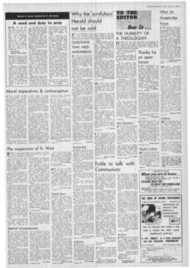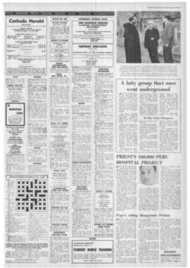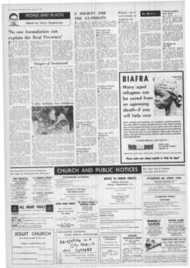Page 3, 30th August 1968
Page 3

Report an error
Noticed an error on this page?If you've noticed an error in this article please click here to report it.
Tags
Share
Related articles
War In Malaya
What Happened To The Church Last Week
Lunch With David Frost
A Powerful Mea 1 This . • 5 J 5
Only The Shrillest Of Voices Here
GETTING OFF THE WHEEL OF MISFORTUNE
By Kerry Stephenson
TAXI TOM, Exeter Jack, Peter of Luton, Bren dan the Irishman . . they were all there in a . rather dingy backroom of a community centre in the decaying side of the district which hides behind Westminster Abbey.
An eavesdropper would have been forgiven for thinking that the gathering of about 30 men and a sprinkling of women were all members of the underworld fringe.
Take snippets of the conversation: "Name any prison and I've been in it." "I stole. cheated and conned my way through life." "When I ran out of friends to con, I started borrowing from my mother." "NormallyI'm not a violent person, but as soon as I saw that bloke outside the dogtrack with a fistful of notes something compelled me to punch him with every ounce of strength 1 could muster."
The gathering was not a reunion of "old lags" but a weekly meeting of Gamblers Anonymous, which, like the
better known Alcoholics Anonymous, picks humans out of the gutter and hopes to restore their human dignity.
Like A.A., Gamblers Anonymous can only help those cornpulsive gamblers who have reached rock bottom and arc prepared to admit that the only way back to sanity is "through a power greater than themselves," in other words God as they understand him.
Gamblers Anonymous was imported from America by that arch-foe of gambling, the Rev. Gordon Moody, about four years ago. It now has flourishing branches in London, the Provinces, Scotland, Dublin and Belfast. Only about one in 10 of the gamblers who are introduced to G.A. stay with it, but in terms of combating human suffering it has had tremendous success.
Britain's explosion of betting
shops, bingo halls and casinos make dull statistics. It is only when people like Mr. Moody probe beneath the statistics that that real cancer of compulsive gambling is exposed.
To say the turnover on betting on horses and greyhounds in 1967 exceeded £1,200 million does not cause the general public much loss of sleep. Neither does the fact that there are more than 2,000 licenced bingo clubs in Britain, about 37,500 gaming machines or more than 1,000 casinos. The rare occasions the Press turns its attention to gambling
is usually when some extortion racket or race horse "nobbling" is exposed.
The tragedy IV gambling makes such mundane and uninteresting reading that it is left to the social workers, the ' "do-gooders" and the families of compulsive gamblers to bear the brunt of the misery.
The unpaid bihs, lies, broken families, jail sentences and criminal histories which compulsive gambling cause, are hidden away in statistics about mental illness, children in care, National Assistance and suicide.
"Compulsive gambling stems from immaturity." says Mr. Moody. "It can start in many ways and is in no way limited to any social group."
Not surprisingly. there are a high proportion of Catholic gamblers. This can be attributed to many factors, but the immigrant Irish problem is a contributing factor.
As Brendan the Irishman told the recent meeting of G.A.: "I left Ireland when things got too hot for me. My
gambling debts got beyond me and there was no one I could go to for a sub."
Sid, a docker, in confessing his sins of gambling to his fellow G.A. members said his moment of truth came when he realised he could no longer keep deceiving his wife about his gambling debts.
To justify his losses, his days off work (because he was too scared to face those from whom he had borrowed money) and his prolonged absence from his home, he told lie after lie. The point came when he detested himself.
In desperation he was forced to confess all, and the more he confessed, the more he could see that his wife hated him.
Fortunately, through G.A. his personal life is now back on an even keel. Still he has to continue his "confessions" or group therapy at G.A. if he is to stay "off" gambling. For, like the compulsive drinker, he is just one bet away from sinking into degradation again.
The secret of G.A. successful rehabilitation of the compulsory gambler—often an ex
prisoner, divorcee or convicted criminal—is that no man is judged, condemned or preached at.
Compulsive gambling, like alcoholism, is a sickness, and is recognised as such by its members. The road back to sanity is a "spiritual" one which is Christian in concept, but not one demanding that a person should in any way be a church-goer or even religious. The therapy has its power in the existence of a "community" of friendship which the gamblers establish at their regular meetings. As they say, it is only at a G.A. meeting that "they are among people who really understand them."
An important auxiliary to G.A., some would say vital, is the wives of the compulsory gamblers. As well as giving moral support and understanding to the men. it has its own particular raison d'etre. This is to educate the women to understand the psychology of a gambler and to come to terms with the problem.
Once a wife becomes an ally of her husband, rather than his judge, there is less friction. more love and a stronger determination to solve financial problems by means other than the betting shop or the allnight card school.
The members of G.A. strike one as of above average intelligence, good humoured, deeply sincere and extremely happy.
One of them claims that the happiness experienced after recovery far exceeds that of the average person who has never had a broken marriage, a stretch in jail or slept on a park bench.
Hence the reason why he always commences his therapy by saying: "I'm Peter, and I'm pleased to be able to say I'm a compulsive gambler."
But anyone who sits through a G.A. session of "confessions" is more likely to say: Thank God, I have been saved from that living hell."
Or as Exeter Jack put it: "I started my gambling career when a business associate persuaded me to have a £40 bet on a Derby cert.
"Funnily enough the cert won. I collected £4,500. But it was the costliest f4,500 of my life. It cost me my wife, my business, bankruptcy, eight years in jail and nearly my sanity."
blog comments powered by Disqus









